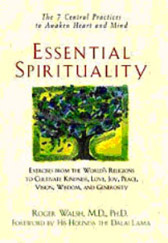First Year
- Orientation to Aware Medicine Training (AMT) and an introduction to mindfulness practice
- Mindfulness experiential sessions, including one after the in-service examination in November
- Seminars held on Mondays or Thursdays over lunch or at other designated times. Topics will include:
- Writing personal and patient health plans
- Ethical issues in patient care
- How to conduct a family meeting
- Defining health
- “Unorthodox” patient beliefs (epistemology and health care)
- Taking a spiritual history
- Cultivating a mindfulness practice
- Health beliefs of members of different cultural and religious groups
- Mindfulness and evidence-based medicine
- As part of the community medicine rotation, a survey of community and hospital resources catering to specific spiritual or cultural needs of patients will be completed.
Second and Third Years
- Additional orientation to the mindfulness component of the Aware Medicine Training Program
- Wednesday seminars featuring speakers representing various belief systems or cultures will be offered
- Mindfulness experiences, tailored to each resident’s individual preferences, will be made available, with funding assistance
- Optional half-day rotation with the chaplain services at one of the local hospitals can be arranged
All Three Years
- One patient case will be logged online each year, to be archived on this site for general access
- Resident-patient interactions will be videotaped. Faculty will evaluate interpersonal skills, cultural sensitivity, and skills in collecting a spiritual history
- Residents will meet at least yearly with mentors of their choice in the healthcare professions who can offer them guidance in the areas of spirituality, self-care, and mindfulness training
- Participants will complete questionnaires regarding their own health and be allowed to review how their answers have changed over time
- Residents will discuss self-care with faculty mentors
- All residents will have ongoing access to online links and resources focusing on spirituality, mindfulness, self care, and other topics
- Residents will be evaluated formally in terms of meeting the Aware Medicine course objectives during twice yearly clinic resident evaluations
- Residents will complete course evaluation forms at end of each year of training
Recommended Reading
Residents are encouraged to read Essential Spirituality, by Roger Walsh, as part of the three-year Aware Medicine course. This book draws its ideas from a variety of different belief systems, and it respects that readers may not be affiliated with any of them. It takes common threads from traditions worldwide and offers readers a chance to determine if they are relevant or not. Again, the intent of this course is to facilitate self-exploration, not to promote a particular set of beliefs or perspectives.

“How to achieve this discovery of our true self is the central question of life, and it is here that the great religions offer their greatest gift. Each of them contains a set of practices designed to help us reach this goal…”
“Among the many spiritual practices, there are seven that are common to authentic religions and that we can therefore call perennial practices. These perennial practices were discovered by the religious founders and have been used by millions of men and women around the world…”
“The seven perennial practices are:
- Transform your motivation: reduce craving and find your soul’s desire.
- Cultivate emotional wisdom: heal your heart and learn to love.
- Live ethically: feel good by doing good.
- Concentrate and calm your mind.
- Awaken your spiritual vision: see clearly and recognized the sacred in all things.
- Cultivate spiritual intelligence: develop wisdom and understand life.
- Express spirit in action: embrace generosity and the joy of service.”
-Kenneth Walsh, Essential Spirituality
